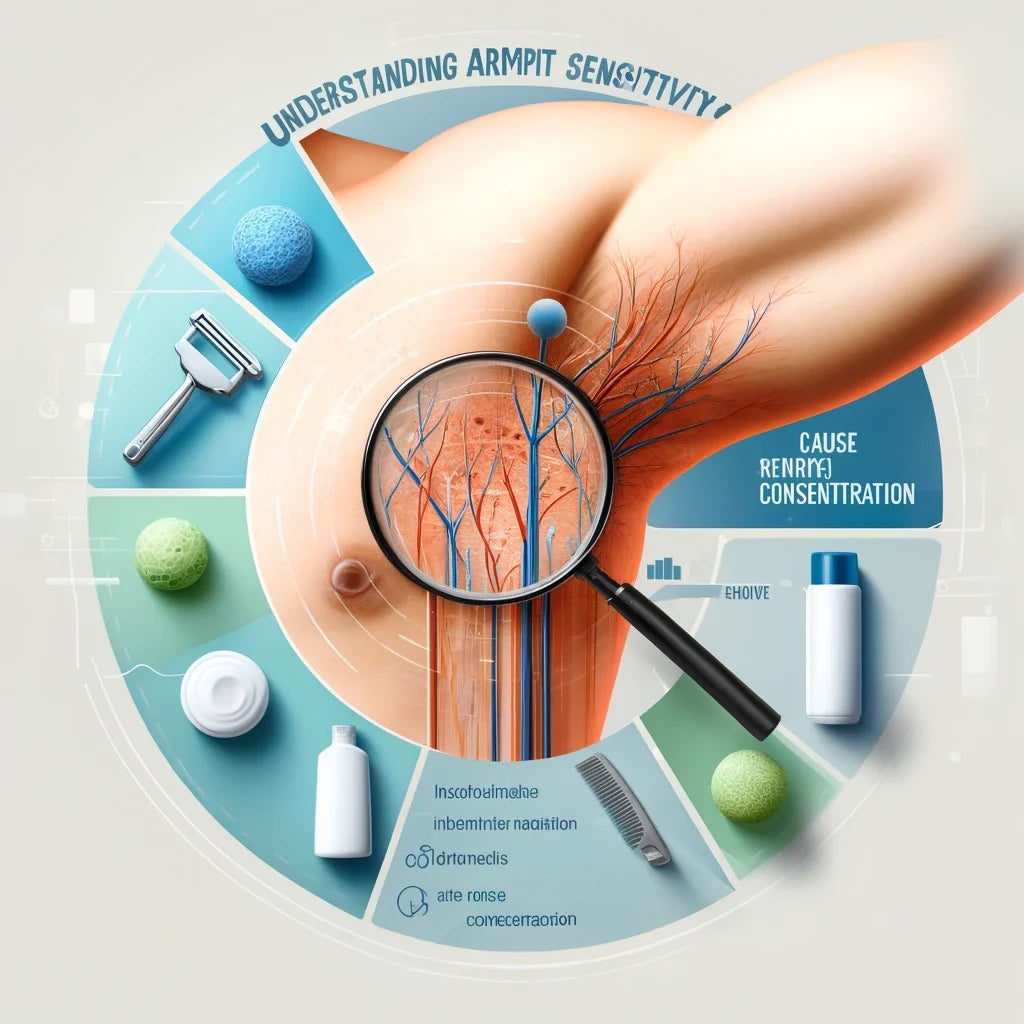Table of Contents
Understanding Armpit Sensitivity
Armpit sensitivity can be a common issue caused by several factors. Armpits have a high concentration of nerves, making them more sensitive to touch. This area is also prone to skin irritation due to sweat, friction, and shaving. Irritated skin can become more sensitive and painful over time.
Reasons for Increased Sensitivity:
- Nerve Concentration: The armpits contain a large number of nerves, making this area highly responsive to stimuli.
- Skin Irritation: Frequent shaving, waxing, or use of deodorants can irritate the skin, leading to increased sensitivity.
- Lymph Nodes: Armpits contain lymph nodes that can become swollen or tender, contributing to discomfort.
Sensitivity Triggers:
- Shaving: Regular shaving can cause micro-abrasions, leading to irritation and sensitivity.
- Deodorants and Antiperspirants: Certain chemicals in these products can cause allergic reactions or skin irritation.
- Friction: Tight clothing or repetitive arm movements can cause chafing, increasing sensitivity.
Managing Sensitivity:
- Gentle Care: Use hypoallergenic or natural products to reduce irritation.
- Proper Hydration: Keeping the skin moisturized can prevent dryness and discomfort.
- Avoid Tight Clothing: Loose-fitting clothes reduce friction and allow the skin to breathe.
Research has shown that females tend to be more sensitive to touch in their armpits, potentially due to hormonal differences. Understanding these factors can help us better manage and reduce armpit sensitivity, leading to more comfortable daily living.
Common Causes of Sensitive Armpits
Many factors can make armpits sensitive to touch. These include skin conditions, irritations, infections, and inflammations, leading to redness, itching, and swelling. Recognizing these causes can help in finding relief and proper treatment.
Skin Conditions and Irritations
Various skin conditions can cause armpit sensitivity. Contact dermatitis is one of the most common issues, often resulting from an allergic reaction to deodorants or other skin products. This leads to itching, red rashes, and discomfort.
Frequent shaving can also irritate the skin, causing small cuts or ingrown hairs. These can become inflamed and painful. Using harsh soaps or cleansers may strip the natural oils from the skin, making it dry and more sensitive.
Hidradenitis suppurativa is another skin condition that affects the armpits. It involves painful lumps under the skin due to blocked hair follicles. This condition can cause severe sensitivity and discomfort.
Infections and Inflammations
Infections are a significant cause of sensitive armpits. Bacterial infections, often resulting from cuts or ingrown hairs, can cause redness, swelling, and pain. Staphylococcus aureus is a common bacteria leading to such infections.
Viral infections can also play a role. For instance, certain viruses might make the skin more sensitive and prone to pain.
Swollen lymph nodes are another cause of sensitivity. These can swell due to infections or other immune responses, causing discomfort when touched. Hidradenitis suppurativa can also involve inflamed sweat glands, leading to painful, swollen areas in the armpits.
Inflammatory conditions like acne can also affect the armpits, leading to sore, sensitive skin. Identifying the specific cause can help in finding the right treatment and relief.
Symptoms Indicating Medical Attention

Sometimes, sensitive armpits can signal serious health issues that need a doctor's attention. These could involve severe conditions or reactions that require prompt diagnosis and treatment.
Serious Conditions and Complications
Armpit sensitivity might indicate severe health problems such as breast cancer or lymphoma. Persistent tenderness in the armpit, especially if accompanied by lumps or swollen lymph nodes, should never be ignored. These symptoms may point to malignancies where early diagnosis can be crucial.
Weight loss and night sweats are additional red flags. These are often associated with cancers like lymphoma. If you notice a lump that feels firm and doesn't move, it's important to see a healthcare provider immediately. Timely intervention can make a significant difference.
Allergic Reactions and Autoimmune Disorders
Allergic contact dermatitis and irritant contact dermatitis are common causes of armpit sensitivity. These conditions arise from reactions to deodorants, soaps, or fabrics that touch the skin. Symptoms like intense itching, redness, and swelling indicate a need for medical advice.
Autoimmune disorders such as rheumatoid arthritis and lupus can also lead to armpit sensitivity. These illnesses cause systemic inflammation that might impact the armpits. If you experience widespread symptoms like joint pain or fatigue along with armpit tenderness, a doctor’s evaluation is essential.
For more detailed information on health conditions linked to armpit sensitivity, you can refer to articles on specific topics like breast cancer symptoms or autoimmune disorders.
Treatment and Management Options
Sensitive armpits can be bothersome, but there are several ways to manage the condition effectively. We will explore various medical treatments and lifestyle changes that can help reduce sensitivity and discomfort.
Medical Treatments
Several medical treatments can help manage sensitive armpits. Topical medications such as corticosteroid creams can reduce inflammation. Antibiotic creams may be prescribed if a bacterial infection is present. For persistent issues, oral medications like antihistamines can alleviate allergic reactions causing sensitivity.
Botox injections may be recommended for excessive sweating, which can worsen sensitivity. In some cases, surgery might be necessary to remove sweat glands or treat underlying conditions. If dermatitis is a concern, healthcare providers may recommend specific non-irritating body washes and lotions.
Rewarming protocols, useful in treating frostbite, may also help when sensitivity is due to cold exposure and must be cautiously conducted under medical advice.
Lifestyle and Home Remedies
Maintaining proper hygiene is crucial. Regular washing with mild, non-irritating soaps can prevent infections and minimize sensitivity. We should also ensure our clothing is loose and breathable to reduce irritation from friction.
Using unscented deodorants or those formulated for sensitive skin can help avoid chemical irritants. Keeping the armpit area dry by using talc-free powders can also be beneficial. Sometimes, simple home remedies like applying ice compresses or cooling lotions may provide immediate relief from discomfort.
Rest and hydration are essential for overall skin health. Daily gentle exercises can improve circulation in the area, promoting faster healing. Making sure we follow a balanced diet rich in vitamins and minerals is also key for maintaining healthy skin.
Prevention Strategies

Keeping our armpits healthy and comfortable requires some careful steps. Let's explore some effective prevention strategies.
Shaving: Use a sharp, clean razor to avoid razor burn and irritation. Shave in the direction of hair growth, and consider shaving less frequently to reduce sensitivity.
Deodorants: Choose a deodorant that is free from harsh chemicals and fragrances. Natural deodorants with soothing ingredients like aloe vera or chamomile can help reduce irritation.
Lotion: Apply a gentle, hypoallergenic lotion regularly to keep the skin moisturized. Look for products with calming ingredients like shea butter or coconut oil.
Allergens: Avoid products that contain allergens. Check for potential irritants in body washes, lotions, and deodorants. If you notice a reaction, switch to a hypoallergenic product.
Laundry Detergents: Use mild, fragrance-free laundry detergents. Residues from harsh detergents can cause skin irritation in sensitive areas like the armpits.
Hygiene: Maintain good hygiene by washing your armpits daily with a gentle cleanser. This reduces bacteria buildup and prevents irritation.
Stretching: Regular stretching exercises can improve circulation in the armpit area and prevent stiffness. Simple movements like arm circles and shoulder rolls can make a difference.
Implementing these prevention strategies can help keep our armpits comfortable and healthy.
Frequently Asked Questions
Armpit sensitivity is a common issue that can arise due to various health conditions or environmental factors. Understanding the reasons behind this sensitivity can help in managing the discomfort effectively.
When should I be concerned about armpit pain?
You should be concerned if the pain is severe, persists for more than a few days, or is accompanied by other symptoms like swelling, redness, or a fever. These could indicate an infection or another serious condition that requires medical attention.
What causes sharp pain under the left armpit?
Sharp pain under the left armpit could be due to muscle strain, infections, or even issues related to the heart. It's important to monitor other symptoms and consult a doctor to rule out conditions such as angina or heart attack.
What are the reasons for tenderness in the underarm area?
Tenderness in the underarm area can be caused by conditions such as infections, lymph node swelling, or irritation from shaving and deodorants. Sensitivity of the TPT can also contribute to discomfort in this area.
What might cause pain under the right armpit in males?
Pain under the right armpit in males might be from muscle strain, infections, or even skin conditions. Activities like weight lifting can strain the muscles, leading to discomfort. It's also important to consider possible lymph node issues.
Is it normal for the skin in the underarm area to be extremely sensitive?
Yes, it is normal for the skin in the underarm area to be sensitive due to the thin skin and numerous nerve endings present. Activities like shaving or using certain deodorants can increase this sensitivity.
Can nerve issues lead to weird pain sensations in the armpit?
Yes, nerve issues can lead to strange sensations in the armpit. Conditions like brachial plexus injury or nerve sensitivity can cause unusual pain or tingling sensations. Consulting a doctor can help diagnose and treat these issues effectively.

